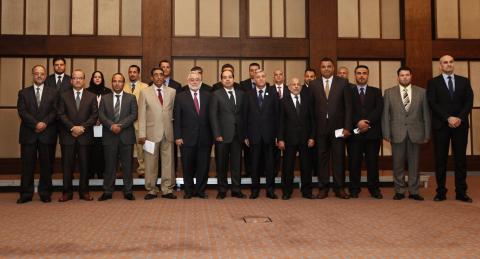Advertisement
Eastern Libya Oil Rebel Rejects New Government
TRIPOLI (Reuters) - The leader of the protesters occupying Libyan oil ports said on Monday he did not recognize Prime Minister Ahmed Maiteeq's new government and suggested a previously agreed deal to end his blockade could be in jeopardy.
Ibrahim Jathran, who wants more autonomy from Tripoli for his eastern region, had agreed with Maiteeq's predecessor to steadily end the protests, which have cut the OPEC member country's oil exports after the ports fell under his control last summer.
Jathran's statement added to the opposition to Maiteeq, a businessman backed by the Muslim Brotherhood, who was appointed two weeks ago in a chaotic, parliamentary vote that prompted anti-Islamist factions to challenge his legitimacy.
Libya's parliament, the General National Congress, has been paralyzed by infighting among pro- and anti-Islamist, tribal and regional factions vying for influence in the chaos that followed the 2011 uprising against Muammar Gaddafi.
"All options are on the table," Jathran said, without a direct reference to the oil accord. "If the parliament keeps with its decision on the new government, then we will take a different position than we have before."
Keeping ports closed will be a blow to Maiteeq's new government, with the country's oil production down to 160,000 barrels per day (bpd) compared with 1.4 million bpd because of the Jathran blockade and other pipeline protests.
In a further complication, a deputy parliamentary president sent a letter on Monday to Maiteeq's predecessor, Abdullah al-Thinni, asking him to stay on because a justice ministry body had ruled Maiteeq's initial election by parliament was illegal.
It was not clear how Thinni would respond to the request, which his spokesman said he had received. He asked to step down from the prime minister's post after gunmen attacked his family. His predecessor was ousted by parliament in March.
Three years after Gaddafi's demise, rival brigades of former fighters allied with competing political factions are the real power brokers, often challenging the weak central government to make their own demands.
A renegade former army general, Khalifa Haftar, has also challenged Maiteeq's appointment as the third premier since March, reflecting deeper political turmoil.
A week ago, gunmen claiming loyalty to Haftar attacked parliament as part of his campaign against Islamists, and he demanded lawmakers hand over power to a panel of judges.
Haftar, a former Gaddafi ally who broke with the autocrat in the 1980s and spent years in U.S. exile, claims his irregular forces are fighting to purge the country of Islamist militants because the government and parliament failed.
Libya has proposed an early election in June to vote in a new parliament as a way to ease the crisis, though Maiteeq said on Monday he expected his government would stay on past the vote for the new legislature.
(Writing by Patrick Markey; Editing by Robin Pomeroy)



















Add new comment